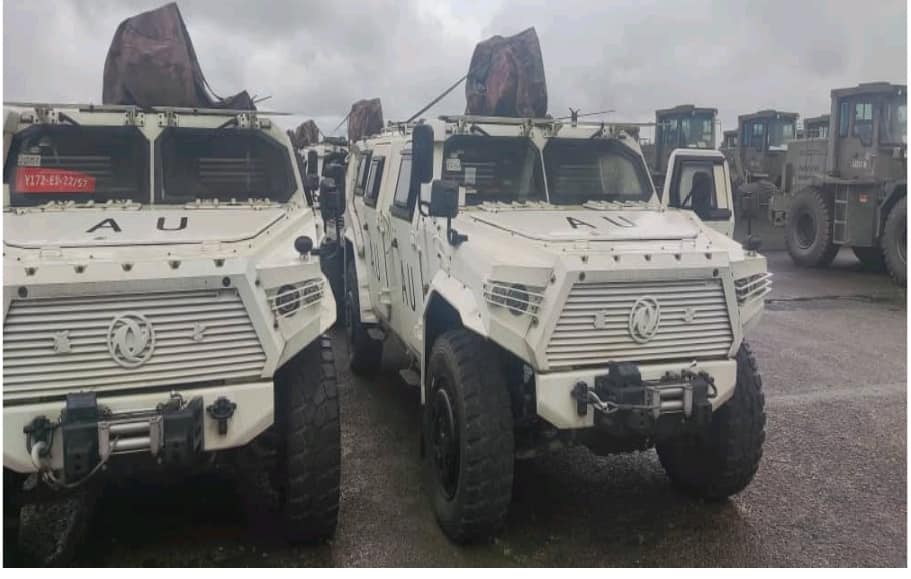The Liberian government’s inaction in funding the transportation of crucial logistical equipment donated by the African Union (AU) to the Armed Forces of Liberia (AFL) presents a concerning situation for the nation’s security and development. The donated equipment, comprising military vehicles, earth-moving machinery, fire trucks, and other vital assets remaining from AU peacekeeping operations, holds significant potential for enhancing the AFL’s mobility, operational capacity, and service delivery capabilities. Valued at approximately US$20 million, this donation represents a substantial opportunity for modernization and improvement, yet it remains stranded at the AU’s Continental Logistics Base in Douala, Cameroon, due to the Liberian government’s failure to allocate the US$1.3 million required for its transportation. This inaction raises serious questions about the government’s prioritization of national security and its commitment to supporting the AFL.
The AFL, facing significant logistical challenges, desperately needs this equipment to effectively fulfill its mandate of protecting Liberia’s sovereignty and providing essential services to the nation. The equipment would not only enhance the AFL’s ability to respond to security threats but also contribute to national development initiatives, such as disaster relief and infrastructure projects. The earth-moving machinery, for instance, could be instrumental in road construction and other critical infrastructure development endeavors. The fire trucks would bolster the nation’s firefighting capacity, improving its ability to respond to emergencies and protect lives and property. The military vehicles would enhance troop mobility and logistical support, allowing for more effective deployment and operations.
Despite the evident benefits and the urgent need, the government, under President Joseph Nyuma Boakai, has demonstrated a concerning lack of urgency in securing the necessary funds. This delay, while seemingly a matter of financial allocation, carries significant implications for national security. The longer the equipment remains in Cameroon, the greater the risk of deterioration, damage, or even potential seizure by other entities. Furthermore, the delay projects an image of unpreparedness and lack of seriousness on the part of the Liberian government, potentially undermining the nation’s standing within the subregion. A well-equipped and mobile military is essential not only for national defense but also for projecting strength and deterring potential adversaries.
The government’s inaction stands in stark contrast to the legislature’s swift allocation of US$1.8 million for the renovation of the Capitol Building following a fire. This disparity in prioritization raises concerns about the government’s commitment to national security and its understanding of the critical role played by the AFL. While the restoration of the Capitol Building is undoubtedly important, the equipping of the nation’s defense force should arguably be of paramount importance. The legislature’s rapid response to the Capitol Building fire demonstrates its capacity for swift action when deemed necessary. This same urgency should be applied to securing the funding for the transportation of the donated equipment.
The prolonged delay in securing the relatively small sum of US$1.3 million compared to the substantial value of the donated equipment—US$20 million—appears perplexing and potentially damaging to Liberia’s image. The situation evokes the analogy of providing someone with a significant gift but neglecting to provide the necessary means for its utilization. This inaction not only undermines the potential benefits of the donation but also reflects poorly on the government’s commitment to supporting the AFL and prioritizing national security. The protracted delay risks creating an impression of inefficiency and a lack of seriousness regarding national defense, potentially emboldening adversaries and undermining Liberia’s standing within the international community.
Therefore, immediate action is required to rectify this situation. The Liberian government must prioritize the allocation of the necessary funds to transport the donated equipment from Cameroon to Liberia. The legislature should also intervene and exert pressure on the executive branch to expedite this process. Further delays not only jeopardize the potential benefits of this substantial donation but also send a dangerous message of unpreparedness and lack of commitment to national security. A well-equipped and modernized AFL is crucial for maintaining peace and stability within Liberia and projecting strength within the subregion. The government must act decisively and swiftly to secure the future of Liberia’s defense capabilities.














